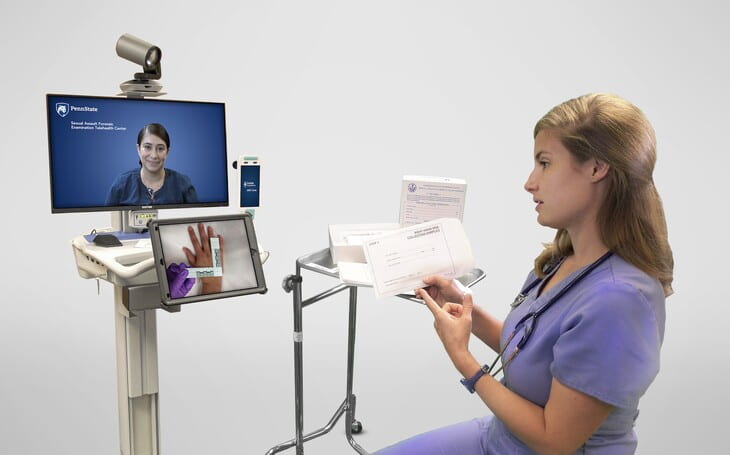
A $1.5 million, three-year grant from the Health Resources and Services Administration will allow the Penn State’s Sexual Assault Forensic Examination Telehealth (SAFE-T) Center to identify and partner with six new rural or underserved community hospital sites in Pennsylvania using innovative telehealth technology to deliver accessible, evidenced based clinical training to local nurse teams in SAFE-T partner communities.
Researchers will also implement the Center for SANE Workforce Advancement, which is based on the SAFE-T Center model, to train teams of sexual assault nurses (SANEs) as well as improve the retention rate through workforce growth, retention, and long-term program sustainability.
“This will allow us to round out our telehealth training program by creating a sustainable model that will give novice SANEs access to training and live examination precepting in areas where little to no expertise exists,” said Sheridan Miyamoto, director of the SAFE-T Center and associate professor of nursing.
“It will also allow new forensic nurses the opportunity to be part of a network of SANEs comprised of all the SAFE-T Center sites to share learning, experiences, and provide support for one another. SANEs will know they are not alone in doing difficult work, which will hopefully lead to higher retention rates in this important specialty.”
Along with Miyamoto, Cynthia Bittner, assistant director; Katherine Veerhusen, clinical education program coordinator; Jonathan Essick, IT manager; Regina Lozinski, research project manager; Joslyn Neiderer, project outreach coordinator; and the SAFE-T Center TeleSANE team will be responsible for establishing the training institute and launching the program at new sites.
About the SAFE-T Center
Launched in 2016 with funding from the U.S. Department of Justice, Office for Victims of Crime, the SAFE-T Center has trained 73 SANE nurses thus far, ensuring local access to high-quality, sexual-assault care for those who need the most help — assault victims — in underserved communities. Additional support for the SAFE-T Center is being provided by the Clinical and Translational Science Institute and the Child Maltreatment Solutions Network, part of the Social Science Research Institute, all at Penn State.

